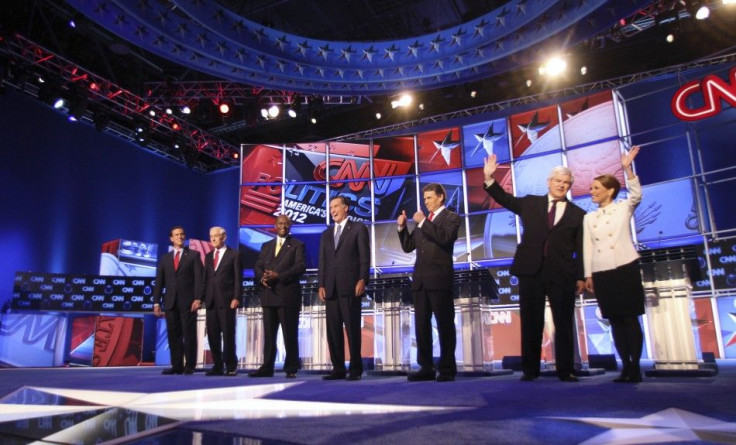GOP Debate Could Separate Contenders From Pretenders Along Economic Lines

The Republican primary debate held in Michigan's Oakland University has the potential to start whittling down the field. Recent headlines lend importance to the event's economic focus, while developments within the campaign may open the doors for a few zingers. But ultimately, Republicans may decide the night's winner with a simple question: Who wants to undo President Barack Obama's work with the greatest fervor?
The debate's location will play a prominent role in the debate, as the Obama administration's bailout of the auto industry in Detroit has received a mixed bag of plaudits and criticism while having a major effect on the local economy.
Former Massachusetts Gov. Mitt Romney has been under the microscope by Democrats for his criticism of the bailout, while the GOP as a whole has lambasted Obama for the intervention. Whether or not the bailout was necessary and helpful has been a contested topic, and it may be interesting to see how candidates engage a crowd inevitably affected -- by most reports for the better -- by the decision.
Romney Likely to Qualify Bailout Stance
Jamie Chandler, a political scientist at Hunter College, said Romney will try to use his bailout stance for positive results.
Romney may equivocate on his government auto industry bailout stance to appeal Republicans who benefited from it, he said.
But the auto bailouts are just a small part of a larger issue: Obama's overall economic policy. Therein rests the crux of tonight's debate, with the candidates most likely continuing their blasting of Obama's economic policies. Take your pick, they'll all be up for grabs.
Obamacare has offered some of the most charged rhetoric from every candidate's podium throughout the debates. It has ignited a staunchly adverse reaction from conservative crowds. Candidates will most likely look to score easy brownie points with the audience and voters by promising its repeal, while also bridging Romney with the plan, which was modeled after healthcare reform instituted while he was Massachusetts governor.
The discussion will inevitably reach a focus on the bounds of government, and the Tea Party mantra of limited power at the federal level. Enter taxes, and the inevitable gulf between the Occupy Wall Street movement and the GOP's own anti-tax mantra. The candidates have all hedged their bets with the Grover Norquist principal of lowering tax rates across the board, with Herman Cain's 9-9-9 proposal getting a thumbs down, while Texas Gov. Rick Perry received the president and founder of Americans for Tax Reform's seal of approval.
GOP Debates: Taxes, Job Creation Are Staples
Taxes and job creation are inextricably linked in GOP debates, and expect the release of October's job numbers to be a hot topic
More broadly, the next few weeks may be decisive for the state of the global economy. An impasse looms over the budget deficit super committee, with prospects for a deal by the Nov. 23 deadline withering. The constantly evolving Eurozone Crisis could serve as a litmus test, weeding out candidates familiar with foreign economic policy from the know-nothings.
One other interesting development to monitor: Who, if anyone, will broach the subject of Cain's alleged misdeeds? Chandler asserted the topic will remain off the table
Don't expect candidates to confront Cain on his sexual harassment scandal; they will work to draw attention back to their economic proposals, he said.
© Copyright IBTimes 2024. All rights reserved.




















